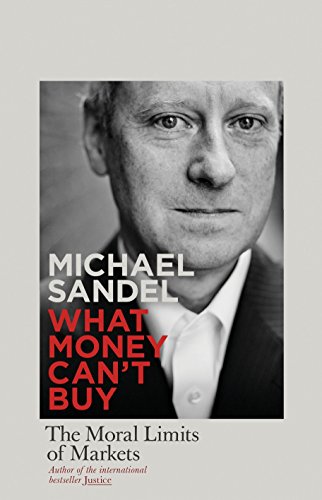Clear and pertinent insights. But, poss’ stating the obvious & preaching to the converted?


Originally published on the Amazon UK website, a number of years back, it seemed to me that this would sit well here, now, along with my recent reviews of a few other more recent books critiquing capitalism.
I like the idea behind this book a lot – what Sandel calls the ‘marketization of everything’ is indeed a cause for concern. And I remember hearing and enjoying his Reith lectures, on BBC Radio 4, back in 2009, on the theme of ‘a new citizenship’, in which, if memory serves, he mentioned some of the ideas discussed in this book.
However, this is a rather thin book in terms of concepts and arguments (I read it in one evening), whilst considered in terms of lists and repetition it is, as several other reviewers have noted, rather fat. When Lyell or Darwin do this, in their books on geology or evolution, one feels the cumulative weight of their evidence was entirely necessary. By comparison, Sandel’s examples seem limited and almost entirely anecdotal. And if, as some reviewers suggest (and I suspect they may be right) this book is preaching to the converted, do we need so many examples?
His opening question, the two principles of ‘coercion’ (relating to fairness and choice in an unequal world) and ‘corruption’ (the corrosive effect that supposedly neutral markets can have in valuing goods), along with the closing statement (actually just a reiteration of the opening questions: ‘Do we want a society where everything is up for sale? Or are there certain moral and civic goods that markets do not honor and money cannot buy?’), supported by a few examples, could’ve made the same case in just a fraction of the space.
An Amazon reviewer calling themselves Sphex has said elsewhere that ‘We all know of public figures who scoff at the idea of progress and make a good living bemoaning the current state of the world’. My guess is (the Sphex quote comes from a review of Stephen Pinker’s Better Angels book) he’s referring to John Gray. Whilst one hopes and imagines that Sandel does at least believe we might be able to do something in the face of ‘market triumphalism’ he offers no ideas whatsoever here: this is really just a long (and, at £20, expensive) litany of woes. Whilst Sandel might not be blowing a dirge on the trumpet of pessimism in quite the same way Gray does, he does appear to be trading in gloom.
Although I’m in more or less complete agreement with him that rampant deregulated capitalism running amok in every walk of life is doing immense amounts of harm, I found the parade of morally repellent practices he adduced as evidence, well… frankly, depressing. And on the evidence given here current trends look resolutely headed towards ever more of life being colonised by commerce. Certainly a debate on these issues is needed. But, as Sandel quite correctly points out, neither debate nor engagement on such issues are in a healthy way.
Sandel is American, which is evident not only in his spelling, but also most of his substantive focus, and I feel this book would have benefitted from casting its net wider. I would like to have given the book more stars, but I don’t think it will change many minds, and amongst its readership the litany of gloom might even prove de-motivational. It didn’t really tell me anything new, other than a few specific details of how awful modern capitalism can be, and how frighteningly amoral or immoral its apologists often are, adding a few gory details to the minutiae of horror that its ever spreading tentacles of doom represent.
As whistle-blowing, or acting the role of the boy who shouts ‘the emperor’s butt naked!’, the points Sandel makes are a necessary element of a debate that needs to be happening. Catch-phrase economists passing off their ‘expertise’ as morally neutral, and the oxymoronic concepts that suggest economics is at one and the same time both scientific and yet also clairvoyant are myths more deserving of deconstruction than, for example, Gray’s pet hate, progress. But as well as the critique, the negative, we need positive suggestions, and there are none to be found here.
